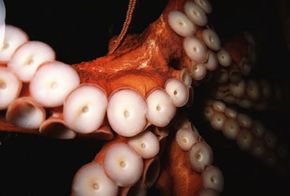Octopus Intelligence: The Complex Nervous System
As you might expect based on its skills in camouflage and avoiding predators, the octopus possesses a well-developed nervous system as well as complex sensory organs. Its eyes, for example, are similar to ours and possess an iris, pupil, lens and retina. The octopus is excellent at spotting prey and reaching to just the right spot to snag it.
In addition, an octopus's brain is proportionally as large as some birds' and mammals' brains. It displays a high level of organization in order to do things like coordinate all of the chromataphores' color changes. The brain is only part of the story though. Three-fifths of the octopus's nerves are distributed throughout its eight arms [source: Mather].
Advertisement
Octopus arms are incredibly strong and flexible. Made almost entirely of muscle, the arms possess the strength to wrestle sharks and to break through Plexiglas. And without those pesky bones and joints (like ours) to limit movement, the arms have an almost infinite range of motion. And yet the octopus can even mimic a human arm by making its arms semi-rigid and bending them in precise places.
In addition, recent research suggests those arms may have minds of their own. Studies indicate that octopus arms each have their own independent nervous system [source: Mayell]. It turns out the brain may simply delegate orders, while the arm is responsible for deciding exactly how to execute the order. Essentially this means that the brain can give a quick assignment to the arm and then not have to think about it anymore. Scientists tested this by severing the nerves in the arms from other nerves in the body and brain and then tickling the arms. Amazingly, the arms responded to the tickling just as they would in a healthy octopus [source: Pickrell].
Octopuses use their limbs for everything from hunting to mating. And, did you know that the seemingly lethargic octopus can actually reach speeds of 25 mph (40 kph)? We'll explore these fascinating facts in the next sections.
